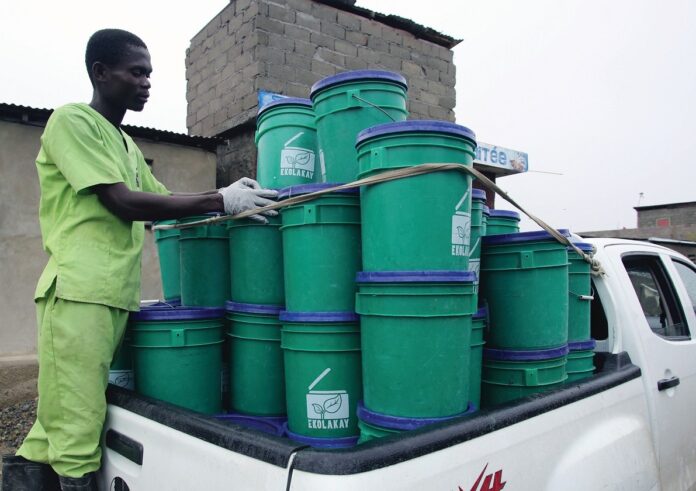IWA held a webinar on how data influences the delivery of sanitation services to those most in need. Erika Yarrow-Soden highlights the key messages.
On 7 September, IWA held a webinar on ‘Improving data systems for sanitation’, led by IWA’s Inclusive Urban Sanitation Initiative and the Water Policy and Regulation Agenda, in collaboration with Eastern and Southern Africa Water and Sanitation (ESAWAS) and WHO-Regnet.
Time is of the essence
The race to achieve the Sustainable Development Goals (SDGs) in time for the 2030 deadline is now measured in years of single figures, yet many countries still lack reliable data to meet the SDG targets on sanitation and wastewater. This is compounded by a lack of understanding of global indicators and methodologies, and their incomplete integration into local and national monitoring systems.
Reliable data is critical
The achievement of meaningful Inclusive Urban Sanitation (IUS) at country level is impossible without robust data systems for informed decision-making. To quote strategist and data management professional, John H. Lingle: “You get what you measure. Measure the wrong thing and you get the wrong behaviours.”
So, how do we bridge the data gaps and ensure that we get the behaviours required to deliver IUS that is successful, sustainable, and equitable?
It is widely agreed that, for IUS programmes to flourish, it is crucial that data systems are addressed at local service level, with accurate data integrated with – and informing – regulatory and national frameworks. This integration not only supports the integrity and reliability of global monitoring systems, but also ensures that decision-making processes are effective.
The aim of this webinar was to: delve into the design of public sanitation data systems to find out how they can contribute to the establishment of strong local and national systems; help attendees develop an understanding of the key performance indicators (KPIs) required to track progress in sanitation at national and global levels; provide insight into tools and methodologies for collecting national level data, taking into account the diverse role of stakeholders and different service arrangements; recognise the importance of data driven decision-making analysis in guiding effective sanitation interventions; and help attendees develop an understanding of the requirements and options for establishing and strengthening public sanitation data systems.
Experience in Zambia
Chola Mbilima, a regulatory expert from Zambia’s National Water Supply and Sanitation Council (NWASCO), explained how the regulator was working to close the country’s sanitation data gaps. Reiterating the message that the importance of reliable data could not be overstated, she described data as a ‘deal breaker’ for service providers and regulators. She also emphasised the necessity of standardisation – for describing sanitation facilities and for data collection tools. Equally important is that the collected data is fed into a system that is equipped to establish an accurate understanding of the extent to which a country’s population is served with sanitation, and by which of the many and various means. Such standards are crucial to ensuring that data is comparable and can be used successfully to inform policy and decision-making – taking data collected at grassroots level through to strategies taken at national level.
NWASCO has a national data system with data provided by service providers to the regulator to help inform regulatory decisions. Mbilima explains: “The regulator needs to analyse this information and visualise it in its various forms so that it may be integrated onto other data, such as that related to climate change or health. We then package this information and share it with the various stakeholders, picking out the critical KPIs and presenting them in a way that is easy to absorb and understand.”
Quoting Leonardo di Vinci’s wise words, “Simplicity is the ultimate sophistication”, she explains that, with many and varied stakeholders, it can be difficult to get consensus on what is required in terms of data. Mbilima concludes that success in delivering effective sanitation programmes is reliant on good engagement with stakeholders, clarification of roles and responsibilities, and an understanding of what data is required to support service delivery.
“If there are inaccuracies in the first layer of data collection, they will permeatE into the decision-making process to the highest level and where the margins of error are greatest”
Stronger through cooperation
Yvonne Magawa, Executive Secretary at the Eastern and Southern Africa Water and Sanitation (ESAWAS) Regulators Association, oversees the support offered to regulators of African water supply and sanitation services to improve urban sanitation by integrating non-sewered sanitation into regulation. Reiterating Lingle’s observation, she explained that IUS is being hampered by unreliable data: “If you can’t measure it, you can’t improve it.”
ESAWAS was established in 2007 to foster and enhance regional cooperation and coordination on regulatory issues through: capacity building and the sharing of information; skills training at national, regional, and international levels; and regional regulatory cooperation to identify and encourage the adoption of best practices to improve the effectiveness of water supply and sanitation services in the region.
“The regulator has a mandate to advise on the status of the sector,” Magawa explains. “In 56% of countries in Africa, reports are produced on service provider performance and benchmarking is a feature of the most impressive reports. But if there are inaccuracies in the first layer of data collection, they will permeate into the decision-making process to the highest level and where the margins of error are greatest.”
“If you can’t measure it, you can’t improve it”
Closing the data gaps
ESAWAS has developed a strategy that focuses on investment in data infrastructure and capacity. To support this, it is developing a maturity index that enables it to get greater understanding of where countries have reached in their data collection infrastructure and guide interventions for improvement.
Digital tools have been developed to support this, including a digital on-demand tool for sanitation service requests (the client), provision (service provider), and monitoring (licensed utility and regulator), which Magawa describes as “the Uber of sanitation for the private sector that is strengthening data collection at local level”.
To further inform decision-making, EquiServe, a service assessment and planning tool, has been developed with support from the Bill and Melinda Gates Foundation. This tool provides information on investment outcomes within the sector, with particular attention to equity, safety, and sustainability.
Wastewater treatment must not be ignored
Francesco Mitis, from the World Health Organization (WHO) and the WHO/UNICEF Joint Monitoring Programme for Water Supply, Sanitation and Hygiene (JMP), closed the webinar with a reminder that data on the delivery of sanitation only goes so far. He highlighted the importance of reliable data on wastewater treatment if safely managed sanitation services are to be achieved. Currently, only 57% of the global population has access to safely managed sanitation services, with 65% of those located in urban environments.
Mitis provided statistics that illustrate the task to provide universal, safely managed sanitation. JMP’s latest progress report finds that 3.5 billion people lack safely managed sanitation, including 1.9 billion with basic services, 570 million with limited services, 545 million with impaired services and 419 million practising open defecation. To achieve universal access to safely managed services by 2030 will require a five-fold increase in current rates of progress (16-fold in least developed countries, 15-fold in fragile continents). Responding to this immense challenge, JMP has embarked on a safely managed on-site sanitation project, with pilot projects in Bangladesh, Ecuador, Indonesia, Kenya, Serbia, and Zambia between 2020 and 2022. This has been rolled out to a second phase of guidance to help address the sanitation needs of populations in Malawi, the Republic of Moldova, Oman, and Nepal.
Resourceful, safe sanitation
The strategic importance of this webinar for those seeking to deliver effective sanitation programmes was emphasised by the agreement of all three speakers that reliable data is an essential element for success. With the immensity of the task of delivering safely managed sanitation to the billions living without it, there is no room for error. However great the will to enable all to live dignified, healthy lives, it will be the attention to detail that will lead to the success or failure of these intentions. To quote American entrepreneur Andy Dunn: “Passion provides purpose, but data drives decisions.” •
More information








